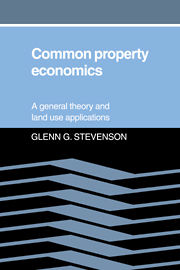Book contents
- Frontmatter
- Contents
- List of Tables and Figures
- Preface
- 1 What Is Common Property?
- 2 Open Access Theory
- 3 Common Property
- 4 The Swiss Grazing Commons
- 5 Comparisons with the English Open Field System
- 6 An Econometric Comparison of Commons and Private Grazing
- 7 The Structure and Performance of Common Property: Conclusions
- References
- Index
2 - Open Access Theory
Published online by Cambridge University Press: 16 September 2009
- Frontmatter
- Contents
- List of Tables and Figures
- Preface
- 1 What Is Common Property?
- 2 Open Access Theory
- 3 Common Property
- 4 The Swiss Grazing Commons
- 5 Comparisons with the English Open Field System
- 6 An Econometric Comparison of Commons and Private Grazing
- 7 The Structure and Performance of Common Property: Conclusions
- References
- Index
Summary
The economics literature is rife with theory on natural resource use under open access and its results. I will not review this literature exhaustively but rather will present three models that encapsulate the results. Once grounded in the effects of open access, we can proceed to examine how common property is different. The open access models that I wish to review are two graphic open access fisheries models, one of which draws on work by Anderson (1977), and two game theoretic approaches. To corroborate the results of the graphic models, the appendix to this chapter presents a mathematical interpretation by Dasgupta and Heal (1979).
Before we forge into these theories, I define an open access resource and overuse of a resource more precisely. Both of these concepts have different meanings to different scholars, and a common basis will be helpful for the work that follows.
Definition of Open Access
An open access resource is a depletable, fugitive resource characterized by rivalry in exploitation; it is subject to use by any person who has the capability and desire to enter into harvest or extraction of it; and its extraction results in symmetric or asymmetric negative externalities.
The rivalry in production of an open access resource indicates that one agent's extraction of the resource precludes another agent's possession. If one agent catches a fish, another cannot possess the same fish.
- Type
- Chapter
- Information
- Common Property EconomicsA General Theory and Land Use Applications, pp. 8 - 38Publisher: Cambridge University PressPrint publication year: 1991



